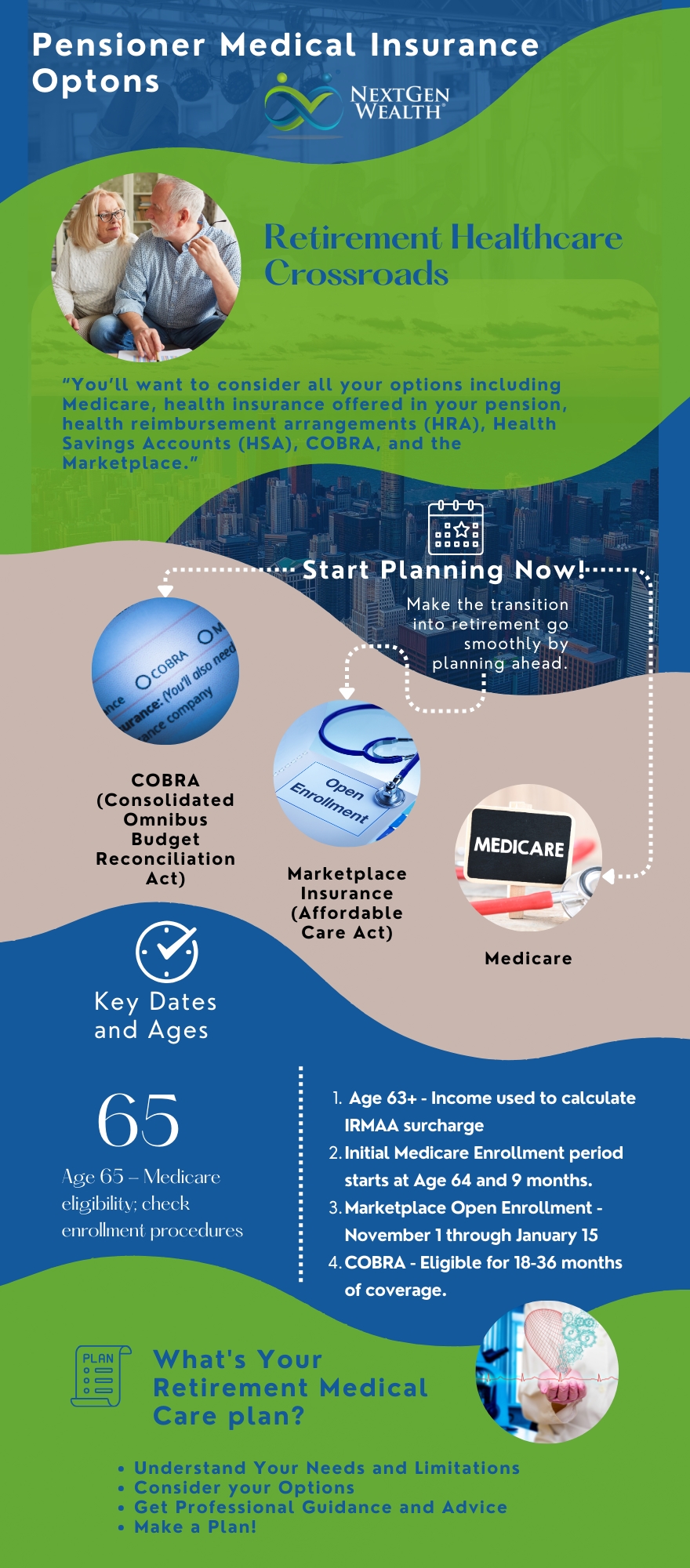Navigating Pensioner Healthcare Options in Retirement - HRA, COBRA, or Marketplace

Healthcare is not getting cheaper. Are you prepared to cover your healthcare expenses throughout your retirement?
Healthcare is cited as the number one cost retirees face. Even if you have a pension, it can be tricky to ensure all your needs are covered. You’ll want to consider all your options, including Medicare, health insurance offered with your pension, Health Reimbursement Arrangements (HRA), Health Savings Accounts (HSA), COBRA, and the Marketplace.
Table of Contents
- The Retirement Healthcare Crossroads
- COBRA (Consolidated Omnibus Budget Reconciliation Act)
- Marketplace for Healthcare
- Retiree Group Health Insurance
- Health Reimbursement Arrangements (HRAs)
- Decision-Making Framework
- Making an Informed Choice
- Optimizing Your Healthcare Coverage
- Managing Costs and Financial Security
- Healthy and Secure Retirement Through Healthcare Planning
- Professional Help
The Retirement Healthcare Crossroads
Navigating all your healthcare options throughout retirement can be confusing at first. You’re faced with many decisions, like when to retire, whether to use a Medigap or a Medicare Advantage plan, and many others.
Your out-of-pocket medical expenses could be in the hundreds of thousands of dollars. This isn’t something to put off until later. We’re not meaning to alarm you, but your medical insurance options are vital to a happy and fulfilling retirement.
Just like anything else, having a solid game plan is crucial. Let’s talk about some of the tools you need to build your own retirement game plan.
COBRA (Consolidated Omnibus Budget Reconciliation Act)
The COBRA (Consolidated Omnibus Budget Reconciliation Act) legislation significantly changed the healthcare landscape. The biggest change we’re talking about here is what’s called “continuation coverage” for your employer group health plan.
This could be really important in your transition phase of retirement. You may find yourself leaving employment sooner than you expected or before you’re eligible for Medicare. Having access to your employer group health care plan could save you a good chunk of money.
You can generally extend your group health care coverage for 18 to 36 months. This is situation-dependent. You must apply for COBRA continuation coverage within 60 days of leaving your job.
Otherwise, you’ll need to purchase medical insurance on your own through the Marketplace. This might even be a better option, but that’s probably not likely.
Marketplace for Healthcare
The Affordable Care Act significantly expanded medical insurance rules and options for Americans. Anyone can use the Marketplace to get medical insurance coverage. You’ll need to create an account to see your options and enroll in a medical insurance plan.
Keep in mind that there is a regular open enrollment period, but you may be able to enroll during a “special enrollment period” if you lose access to health care due to stopping employment. Plan costs vary depending on where you are, income levels, etc.
If you need coverage before you qualify for Medicare, you definitely want to start taking a look at what options you’ll have. It’s also important to consider tax credits or other subsidies you may qualify for.
Retiree Group Health Insurance
Employers who offer a pension may offer group health insurance coverage to pensioners. This can be a major benefit for you. However, your costs and care available may change once you retire. Check your employer’s retirement plan documents carefully to ensure you understand all the ins and outs.
You may also have other options offered through an employer, such as a Health Savings Account (HSA) or a Health Reimbursement Arrangement (HRA). These can help pay for medical expenses throughout your lifetime.
Health Reimbursement Arrangements (HRAs)
Although a Health Reimbursement Arrangement (HRA) isn’t a common benefit, it’s definitely worth paying attention to if you’re offered one. An HRA can be used for medical expenses – including health insurance premiums and copays.
If you have a pension, you might have access to what’s sometimes referred to as a “retiree-only” HRA. This can be a major benefit to you in retirement. Your employer puts money into the account, and you can withdraw those funds for covered expenses tax-free.
One disadvantage is the employer owns these accounts, and the funds in the account can’t be passed on to heirs. Depending on the plan, a “spend-down period” may exist for a surviving spouse or dependent.

Decision-Making Framework
As with any decision, we recommend starting with your desired lifestyle and evaluating different options to meet your needs. You are the most important data point in your healthcare decisions.
We recommend analyzing the costs, benefits, and limitations of each option available to you. Also, changes in your health may force you to retire early or change some of your plans. This can have a significant impact on your options.
It’s always best to seek professionals who can help you decipher and evaluate different plan options. It may take some time to juggle between employer-sponsored health insurance, COBRA continuing coverage, savings (like a health savings account (HSA), the Marketplace, and Medicare to cover your transition into retirement.
This is why we integrate discussions and education around healthcare into our COLLAB Financial Planning Process™. Your health is vitally important to a successful retirement. It’s easy to miss something when you’re in the middle of making decisions.
Making an Informed Choice
Regardless of how much you research, you have to make a decision. You’ll never know the exact right answer until things have already happened. However, you can select the healthcare plan to suit your needs, financial situation, and health goals with the confidence you’ve explored all options.
You want to make sure you’re thinking long-term as well. Just because one option is cheaper or not available now doesn’t mean the situation won’t change later. You’ll need to reconsider this as time goes on and adjust.
This is why we build long-term relationships with our clients. Life changes constantly, and your financial plan will have to adjust to those changes. This is why we believe in planning – not just a one-time plan.
Optimizing Your Healthcare Coverage
We often talk with clients about different healthcare subsidies and other ways to optimize health insurance costs. We want you to get the most “bang for your buck” while covering all your needs.
Sometimes this might mean delaying or skipping some tax-saving strategies like Roth conversions until a little later. However, this is different for everyone.
It’s also important to consider your access to preventive care and specialty care for chronic conditions. This could mean additional costs for Medicare or supplemental coverage. You’ll have to pay for those somehow.
Managing Costs and Financial Security
We’ll always cover spending plans to include healthcare expenses. We can also help project those costs rising with inflation throughout your retirement.
We don’t want you to get caught off guard and get stressed about how to pay for healthcare. We don’t want you to feel like you need to put off going to the doctor just because you’re afraid of the costs. You should be able to see a doctor when and where you need to – knowing you’re covered financially.
Healthy and Secure Retirement Through Healthcare Planning
As the saying goes, a failure to plan is a plan to fail. Healthcare is no different. It becomes even more critical when your financial decisions can directly impact your healthcare costs.
Whether you’re preparing to transition into retirement or are researching Medicare, planning early is always a good idea. There are important deadlines throughout retirement you don’t want to miss, either. You’ll want to stay up to date and prepare yourself.
Professional Help
No matter what happens, your health is your number one resource for a long and prosperous life. Laying the framework now to ensure your access to quality healthcare throughout your life is critical. You really can’t put this off – you need to start thinking about your options now.
At NextGen Wealth, we walk our clients through our comprehensive COLLAB Financial Planning Process™ to ensure all your bases are covered. Best of all, we can help you navigate all the different pros and cons of these important decisions. Contact us today to see how we can help you plan the worry-free retirement you deserve.



